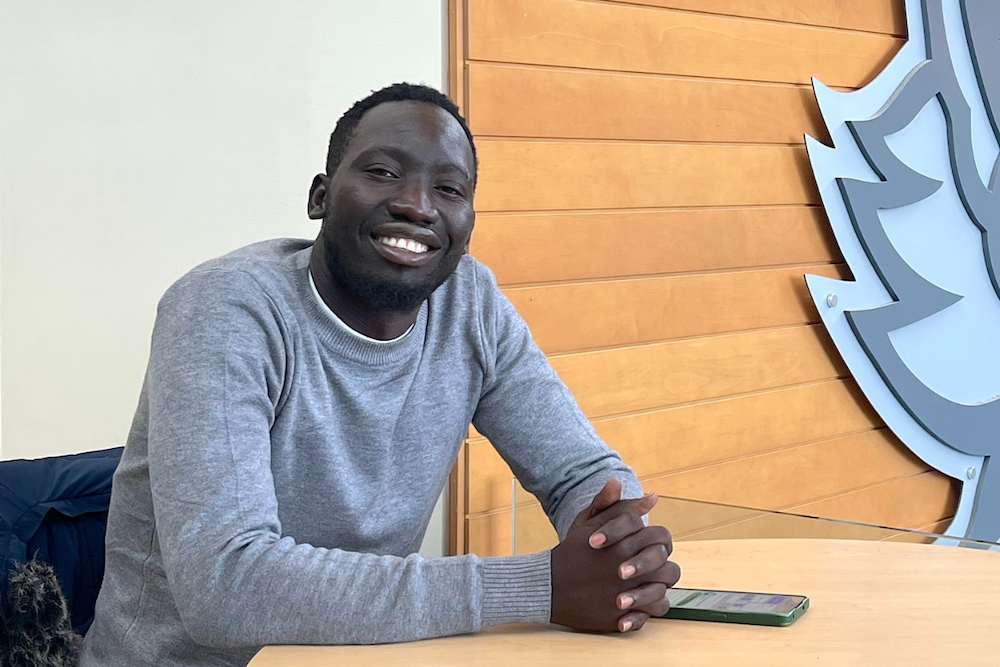Binghamton grad student, musician reaches thousands in quest to build peace in South Sudan
‘Samse Sam’ pursues master’s in genocide and atrocity prevention

As the beat begins, Samuel Sebit Emmanuel Stephens’ voice strikes a deep core with his audience, delivering a message of hope, resilience and solidarity.
Empower the youth
Give them a chance
They are the heart of the nation
Let’s fight corruption
Known by his stage name, Samse Sam, Stephens is strengthening the voices of those working for peace while pursuing a master’s in genocide and mass atrocity prevention at Binghamton University. He sees music as a tool of societal change, a barrier against war and a bridge to peace in South Sudan – and he has already reached tens of thousands through song.
Stephens was born into a war-torn nation, and the turmoil that has long gripped South Sudan claimed his family. After being forced to escape to Uganda, he turned to music – especially the tunes his mother used to sing. Through singing and performing, Stephens found a means of inspiring people as well as healing,
A path shaped by conflict and creativity
“I feel like I’m preserving my mother’s memory when I sing,” Stephens said. “But more than that, I came to see that music could bring people together across political and ethnic divides.”
As his love for music grew, he founded Talent Initiative for Development (TIDE), an organization that uses creative art to promote social justice, peacebuilding and youth empowerment.
Building a movement through music
Stephens used songwriting as a means of community mobilization, human rights, governance awareness-raising and reconciliation-building during the 2013 South Sudanese conflict. “Arakat Karabu,” one of his most influential songs, spoke to many by questioning the loss of independence and the misery brought on by conflicts in South Sudan.
Stephens collaborated with musicians through Talent211 Entertainment, a leading South Sudanese music production company, to produce music projects that addressed conflict. His song “Kifaya” (which means “Enough”) united 15 musicians in an appeal for peace in 2018 and reached tens of thousands of South Sudanese with its message of interethnic collaboration. The song’s success led to a case study, which Stephens co-authored with members of the Institute for Genocide and Mass Atrocity Prevention (I-GMAP) network. In addition to validating his work, the case study’s win in a Syracuse University competition led to a $5,000 grant that assisted TIDE in opening a real office in South Sudan.
Stephens’s vision goes beyond music. He believes in uniting diverse communities to celebrate cultures and foster social cooperation through the Music for Peace festival. Additionally, his organization runs civic education initiatives, guiding musicians to use social media responsibly to avoid hate speech and prepare South Sudanese residents for the 2026 elections.
“We teach artists how to use their online influence for good,” Stephens said. “You encourage violence if you disseminate hateful messages to thousands of followers. However, you can alter lives if you speak up in favor of peace.”
Stephens’s work caught the attention of IGMAP in 2020. His engagement with IGMAP deepened over time, culminating in his selection as a Visiting Practitioner in 2023 and his receipt of the Nadia Rubaii Memorial Fellowship.
“IGMAP isn’t a funding institution, but they have opened doors for us,” Stephens said. “They’ve helped us grow, connect with like-minded organizations and strengthen our impact.”
Stephens has benefited greatly from his association with IGMAP, which has given him access to academic support, financing opportunities and mentorship. Through a collaboration with Syracuse University’s nonprofit management class at IGMAP, TIDE was able to get additional grants totaling $3,500, which enabled it to grow its activities.
Stephens hopes to organize a global music arts for peace festival and bring musicians from around the world together to showcase their talents and use them for conflict resolution. He also intends to broaden his efforts by adding other areas such as poetry, theater and sports as further instruments to promote peacebuilding.
A vision for the future
“The world is grappling with so much conflict,” Stephens said. “I want to create a space where artists from different cultures can come together and address global challenges through their talents.”
As Stephens continues his master’s studies and expands his advocacy work, he remains committed to rewriting the narrative of South Sudan – one song at a time. Every lyric, every festival and every conversation is a step toward peace. And he’s just getting started.
“If we don’t wake up to rewrite our narratives,” Stephens said, “we will continue to enjoy the lies that the rest of the world tells us about us.”
